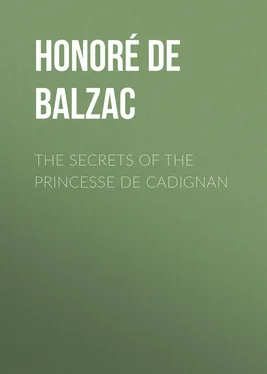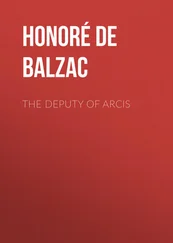Honoré Balzac - The Secrets of the Princesse de Cadignan
Здесь есть возможность читать онлайн «Honoré Balzac - The Secrets of the Princesse de Cadignan» — ознакомительный отрывок электронной книги совершенно бесплатно, а после прочтения отрывка купить полную версию. В некоторых случаях можно слушать аудио, скачать через торрент в формате fb2 и присутствует краткое содержание. Жанр: literature_19, foreign_antique, foreign_prose, на английском языке. Описание произведения, (предисловие) а так же отзывы посетителей доступны на портале библиотеки ЛибКат.
- Название:The Secrets of the Princesse de Cadignan
- Автор:
- Жанр:
- Год:неизвестен
- ISBN:нет данных
- Рейтинг книги:5 / 5. Голосов: 1
-
Избранное:Добавить в избранное
- Отзывы:
-
Ваша оценка:
- 100
- 1
- 2
- 3
- 4
- 5
The Secrets of the Princesse de Cadignan: краткое содержание, описание и аннотация
Предлагаем к чтению аннотацию, описание, краткое содержание или предисловие (зависит от того, что написал сам автор книги «The Secrets of the Princesse de Cadignan»). Если вы не нашли необходимую информацию о книге — напишите в комментариях, мы постараемся отыскать её.
The Secrets of the Princesse de Cadignan — читать онлайн ознакомительный отрывок
Ниже представлен текст книги, разбитый по страницам. Система сохранения места последней прочитанной страницы, позволяет с удобством читать онлайн бесплатно книгу «The Secrets of the Princesse de Cadignan», без необходимости каждый раз заново искать на чём Вы остановились. Поставьте закладку, и сможете в любой момент перейти на страницу, на которой закончили чтение.
Интервал:
Закладка:
Honoré de Balzac
The Secrets of the Princesse de Cadignan
CHAPTER I. THE LAST WORD OF TWO GREAT COQUETTES
After the disasters of the revolution of July, which destroyed so many aristocratic fortunes dependent on the court, Madame la Princesse de Cadignan was clever enough to attribute to political events the total ruin she had caused by her own extravagance. The prince left France with the royal family, and never returned to it, leaving the princess in Paris, protected by the fact of his absence; for their debts, which the sale of all their salable property had not been able to extinguish, could only be recovered through him. The revenues of the entailed estates had been seized. In short, the affairs of this great family were in as bad a state as those of the elder branch of the Bourbons.
This woman, so celebrated under her first name of Duchesse de Maufrigneuse, very wisely decided to live in retirement, and to make herself, if possible, forgotten. Paris was then so carried away by the whirling current of events that the Duchesse de Maufrigneuse, buried in the Princesse de Cadignan, a change of name unknown to most of the new actors brought upon the stage of society by the revolution of July, did really become a stranger in her own city.
In Paris the title of duke ranks all others, even that of prince; though, in heraldic theory, free of all sophism, titles signify nothing; there is absolute equality among gentlemen. This fine equality was formerly maintained by the House of France itself; and in our day it is so still, at least, nominally; witness the care with which the kings of France give to their sons the simple title of count. It was in virtue of this system that Francois I. crushed the splendid titles assumed by the pompous Charles the Fifth, by signing his answer: “Francois, seigneur de Vanves.” Louis XI. did better still by marrying his daughter to an untitled gentleman, Pierre de Beaujeu. The feudal system was so thoroughly broken up by Louis XIV. that the title of duke became, during his reign, the supreme honor of the aristocracy, and the most coveted.
Nevertheless there are two or three families in France in which the principality, richly endowed in former times, takes precedence of the duchy. The house of Cadignan, which possesses the title of Duc de Maufrigneuse for its eldest sons, is one of these exceptional families. Like the princes of the house of Rohan in earlier days, the princes of Cadignan had the right to a throne in their own domain; they could have pages and gentlemen in their service. This explanation is necessary, as much to escape foolish critics who know nothing, as to record the customs of a world which, we are told, is about to disappear, and which, evidently, so many persons are assisting to push away without knowing what it is.
The Cadignans bear: or, five lozenges sable appointed, placed fess-wise, with the word “Memini” for motto, a crown with a cap of maintenance, no supporters or mantle. In these days the great crowd of strangers flocking to Paris, and the almost universal ignorance of the science of heraldry, are beginning to bring the title of prince into fashion. There are no real princes but those possessed of principalities, to whom belongs the title of highness. The disdain shown by the French nobility for the title of prince, and the reasons which caused Louis XIV. to give supremacy to the title of duke, have prevented Frenchmen from claiming the appellation of “highness” for the few princes who exist in France, those of Napoleon excepted. This is why the princes of Cadignan hold an inferior position, nominally, to the princes of the continent.
The members of the society called the faubourg Saint-Germain protected the princess by a respectful silence due to her name, which is one of those that all men honor, to her misfortunes, which they ceased to discuss, and to her beauty, the only thing she saved of her departed opulence. Society, of which she had once been the ornament, was thankful to her for having, as it were, taken the veil, and cloistered herself in her own home. This act of good taste was for her, more than for any other woman, an immense sacrifice. Great deeds are always so keenly felt in France that the princess gained, by her retreat, as much as she had lost in public opinion in the days of her splendor.
She now saw only one of her old friends, the Marquise d’Espard, and even to her she never went on festive occasions or to parties. The princess and the marquise visited each other in the forenoons, with a certain amount of secrecy. When the princess went to dine with her friend, the marquise closed her doors. Madame d’Espard treated the princess charmingly; she changed her box at the opera, leaving the first tier for a baignoire on the ground-floor, so that Madame de Cadignan could come to the theatre unseen, and depart incognito. Few women would have been capable of a delicacy which deprived them of the pleasure of bearing in their train a fallen rival, and of publicly being her benefactress. Thus relieved of the necessity for costly toilets, the princess could enjoy the theatre, whither she went in Madame d’Espard’s carriage, which she would never have accepted openly in the daytime. No one has ever known Madame d’Espard’s reasons for behaving thus to the Princesse de Cadignan; but her conduct was admirable, and for a long time included a number of little acts which, viewed single, seem mere trifles, but taken in the mass become gigantic.
In 1832, three years had thrown a mantle of snow over the follies and adventures of the Duchesse de Maufrigneuse, and had whitened them so thoroughly that it now required a serious effort of memory to recall them. Of the queen once adored by so many courtiers, and whose follies might have given a theme to a variety of novels, there remained a woman still adorably beautiful, thirty-six years of age, but quite justified in calling herself thirty, although she was the mother of Duc Georges de Maufrigneuse, a young man of eighteen, handsome as Antinous, poor as Job, who was expected to obtain great successes, and for whom his mother desired, above all things, to find a rich wife. Perhaps this hope was the secret of the intimacy she still kept up with the marquise, in whose salon, which was one of the first in Paris, she might eventually be able to choose among many heiresses for Georges’ wife. The princess saw five years between the present moment and her son’s marriage, – five solitary and desolate years; for, in order to obtain such a marriage for her son, she knew that her own conduct must be marked in the corner with discretion.
The princess lived in the rue de Miromesnil, in a small house, of which she occupied the ground-floor at a moderate rent. There she made the most of the relics of her past magnificence. The elegance of the great lady was still redolent about her. She was still surrounded by beautiful things which recalled her former existence. On her chimney-piece was a fine miniature portrait of Charles X., by Madame Mirbel, beneath which were engraved the words, “Given by the King”; and, as a pendant, the portrait of “Madame”, who was always her kind friend. On a table lay an album of costliest price, such as none of the bourgeoises who now lord it in our industrial and fault-finding society would have dared to exhibit. This album contained portraits, about thirty in number, of her intimate friends, whom the world, first and last, had given her as lovers. The number was a calumny; but had rumor said ten, it might have been, as her friend Madame d’Espard remarked, good, sound gossip. The portraits of Maxime de Trailles, de Marsay, Rastignac, the Marquis d’Esgrignon, General Montriveau, the Marquis de Ronquerolles and d’Ajuda-Pinto, Prince Galathionne, the young Ducs de Grandlieu and de Rhetore, the Vicomte de Serizy, and the handsome Lucien de Rubempre, had all been treated with the utmost coquetry of brush and pencil by celebrated artists. As the princess now received only two or three of these personages, she called the book, jokingly, the collection of her errors.
Читать дальшеИнтервал:
Закладка:
Похожие книги на «The Secrets of the Princesse de Cadignan»
Представляем Вашему вниманию похожие книги на «The Secrets of the Princesse de Cadignan» списком для выбора. Мы отобрали схожую по названию и смыслу литературу в надежде предоставить читателям больше вариантов отыскать новые, интересные, ещё непрочитанные произведения.
Обсуждение, отзывы о книге «The Secrets of the Princesse de Cadignan» и просто собственные мнения читателей. Оставьте ваши комментарии, напишите, что Вы думаете о произведении, его смысле или главных героях. Укажите что конкретно понравилось, а что нет, и почему Вы так считаете.












